Estimated reading time: 7 minutes
Do you grow berries at your place?
They’re a fantastic addition to any food garden. One of the best things about growing berries is that you can get a quick yield. It usually takes years to get a result from your fruit tree, but you can (potentially) get a crop of berries the same year that you plant them.
Why you should grow berries
Berries grow quickly and are very productive, which means you get a quick return on the investment of your time, energy, and money. This can really boost your enthusiasm for growing your own food.
Plus, berries are delicious and very good for you.
They’re also a high-value crop that gives you plenty of potential for preserving, selling, or trading your excess.
And best of all? They’re relatively easy to grow (though of course, being gardening, there are also lots of things that can go wrong).
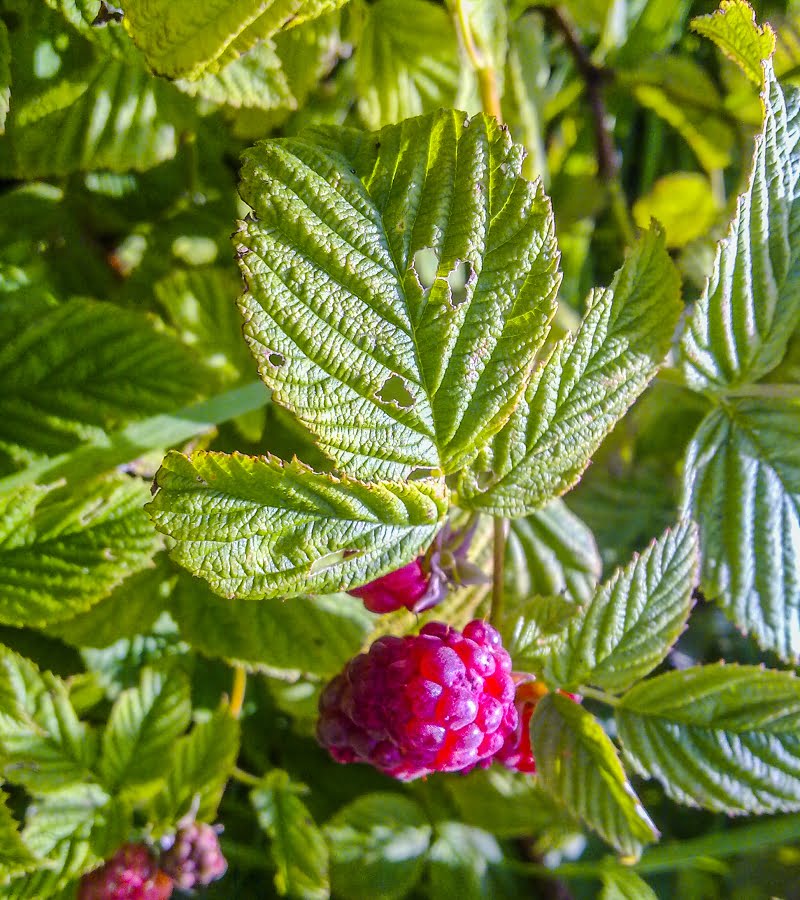
What sort of berries should you be growing?
There’s a long list of berries to choose from. As with everything in your garden, aiming for biodiversity is the best strategy.
The more different types of berries you grow, the higher the chance that you’ll have a decent harvest every single year. The same berries might not perform well each year, but with variety in your garden you should get a great crop every year.
Some of the more well-known (and easy to source) include:
- Raspberries
- Strawberries
- Blueberries
- Blackberries
- Boysenberry
- Red, black, and white currants
- Loganberries
- Tayberries
- Youngberries
Mulberries are also popular, but they grow on a tree, so have the same wait time as other deciduous fruits. If you want to get a bit more exotic, there are also plenty of less well-known berries that might find a place in your garden, such as:
- Acai berries
- Barbados cherry
- Bilberry
- Cranberry
- Elderberry
- Goji berries
- Gooseberries
- Huckleberries
If you’re relatively new to gardening, we’d recommend getting some experience with the more common types of berries first. It’s easier to source the plants, and easier to get information about how to grow them.
Problems that can crop up when growing berries
We grew raspberries commercially for many years. So we know first-hand what a successful, in-demand, and high-value crop they are.
Like all food plants, they love healthy soil. Compost, worm castings, and microbe-food are all great soil additions if you want to grow a healthy crop.
Berries also need plenty of water, pruning at the right time, and something to climb up or contain their growth.
But things didn’t always go smoothly, and we experienced a number of problems with them over the years.
The top 5 issues with berry growing
Over the decade or so that we grew raspberries, our top 5 issues were:
- Fruit being eaten by birds
- Wind damage, especially from the hot summer northerlies that we get at our place
- Sunburn and being able to adequately protect from the sun, particularly in heatwaves
- Phytophthora root rot
- Keeping up with the picking (not a bad problem to have!)
Learning from expert berry growers
We had the chance a while ago to make a field trip to Sunny Creek Organic berry farm in Gippsland and spent a productive afternoon touring the farm and picking berry farmer Phil’s brain.
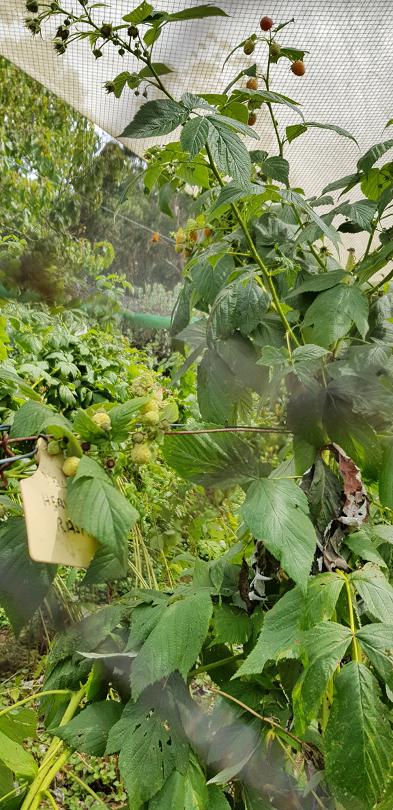
Phil and his partner Cathie have been growing berries of all kinds for more than 35 years, so they have a wealth of experience. We were very interested to see how they have overcome some of the problems we ran into with the berries.
Boy, did we learn a lot in one day!
What do berries need?
First, berries need sun-protection all season or they get sunburned. We thought this only happened on super-hot days with a scorching hot north wind, but in fact, it can happen at much lower temperatures.
Interestingly, it can also take weeks for the damage to show up. We only grew one variety (called Bogong raspberry), so this may explain why in our years of berry growing we didn’t always realise when sun damage had occurred.
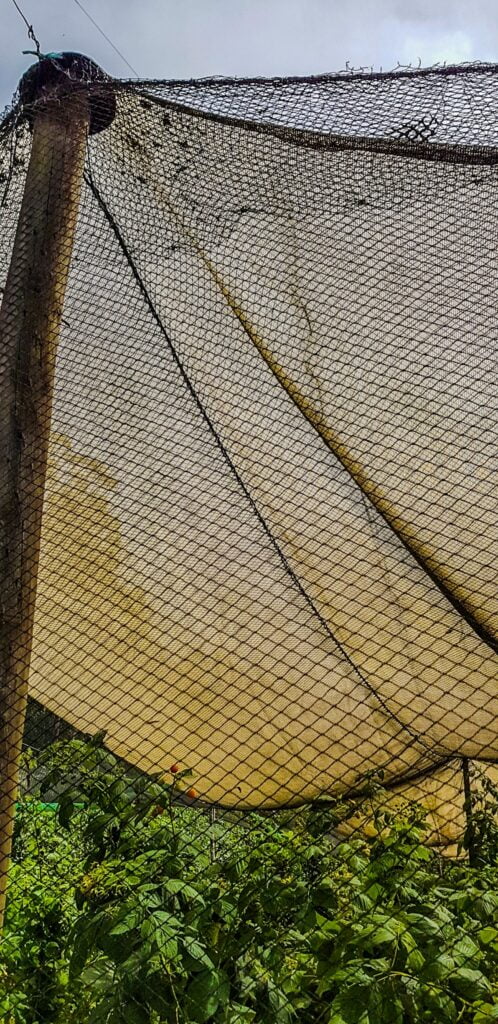
This problem is almost completely alleviated with shade protection (like shade cloth). So, lesson 1—include shade cloth covers in your design from the get-go.
How to protect organic berries from disease
Another topic we were interested in was disease control.
One of the big problems we encountered when we grew raspberries was Phytophthora (a fungal root-rot disease), so we were particularly interested in organic solutions. We came away with a much better understanding of how to manage this disease.
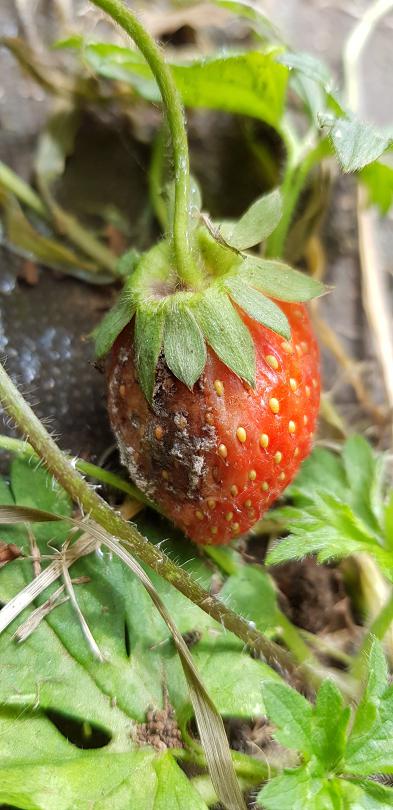
For example, we discovered that raspberries are prone to a raspberry-specific strain of Phytophthora. This means that a patch where fruit trees have previously been affected by Phytophthora may still be suitable for raspberry growing.
We also learned that:
- Some varieties of raspberries are more resistant to Phytopthora than others;
- Brambles don’t get it at all;
- Mounding the soil helps;
- One of the biggest risks of infection is from the public.
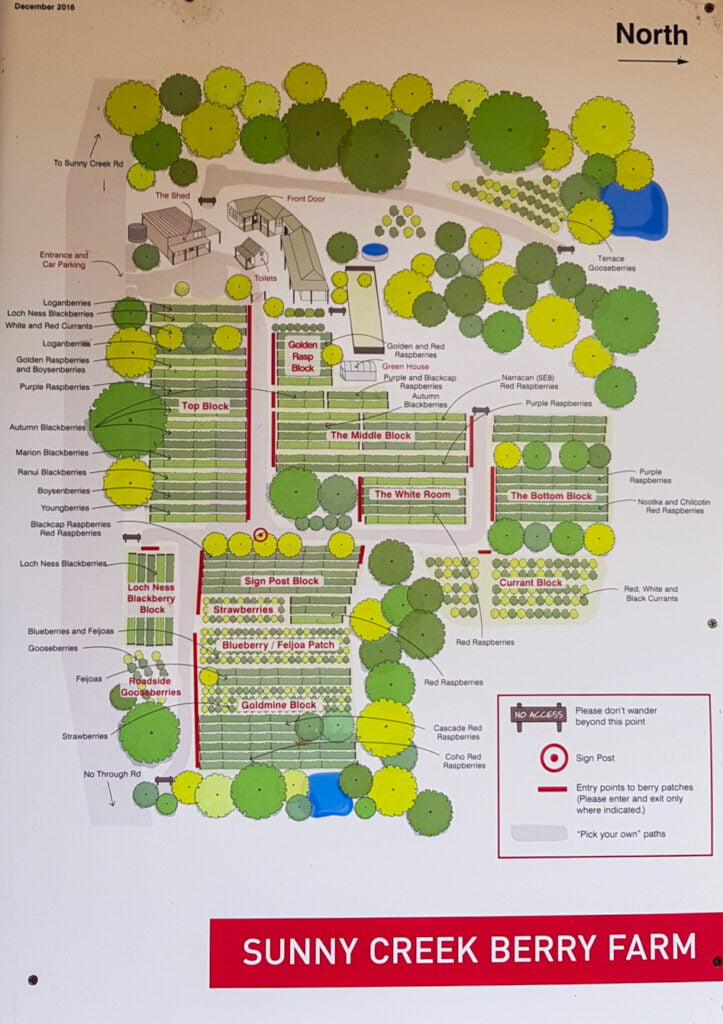
Phil also very generously shared loads of information with us about nutrition, seasonal care, pruning, variety selection, running the pick-your-own operation, marketing, and value-adding.
It was an amazing day!
Learning how to grow berries (quickly)
Field trips to fellow farmers are one of the fastest and most useful ways for us to learn new things in a short space of time. We know from experience how busy farming life is, and so are incredibly appreciative when farmers like Phil give so generously of their time to share their knowledge and expertise.
It also lets us share the information with you, to help you on your very own berry journey.
So next time you’re over Trafalgar South way, pop into Sunny Creek Farm and pick some amazing organic berries. Tell Phil that Hugh and Katie sent you.
And in the meantime, plan to get some berries in the ground this year.
Related Articles
How to tell fruit buds from leaf buds
Understanding the difference between fruit buds and leaf buds on your fruit tree makes everything else about fruit growing easier.
Will subtropical fruit trees work in your garden?
A lot of subtropical fruit comes from indigenous forest cultures, but that doesn’t mean you can’t grow it in your backyard.
Animals, fruit trees, and electric fences
Animals and fruit trees go well together if you can figure out how to enjoy the benefits without the animals doing too much damage.

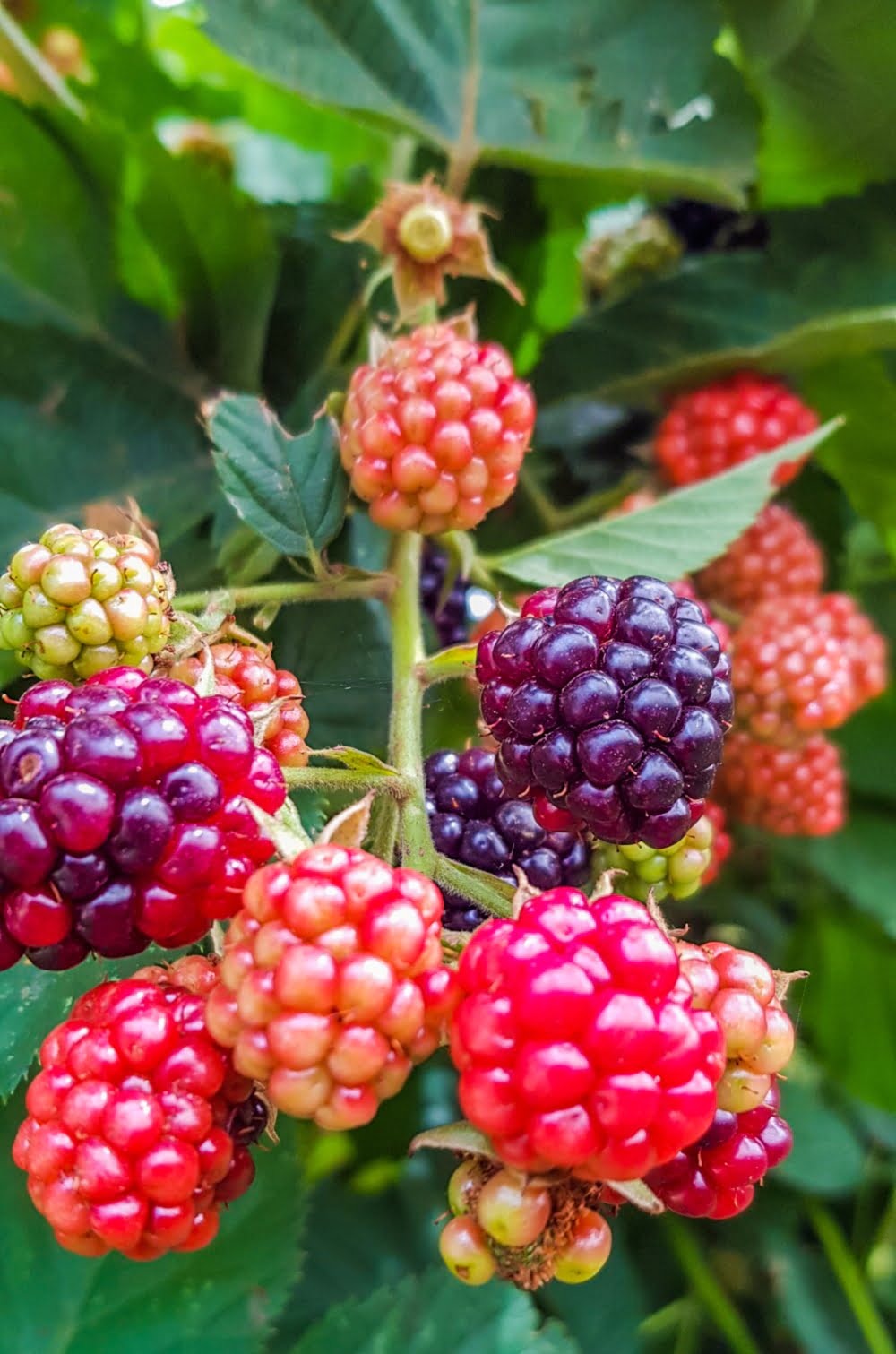
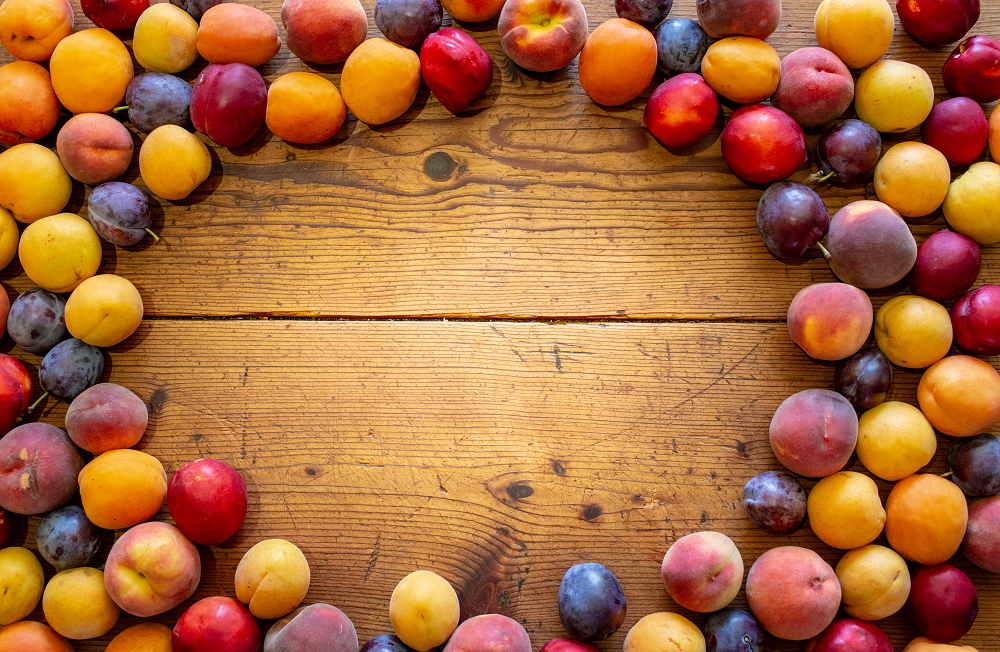
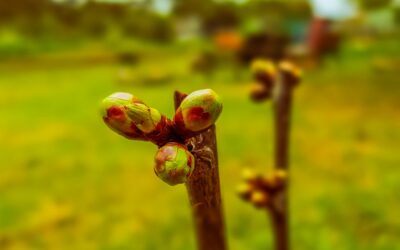
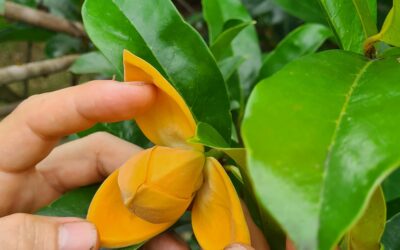

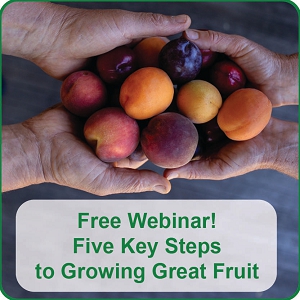
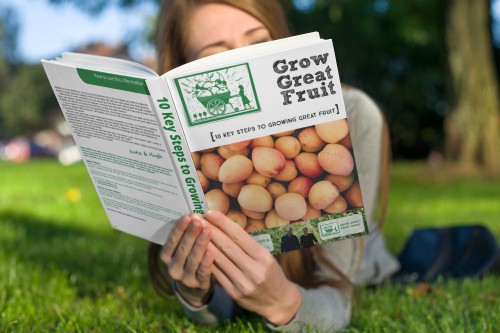
Hi Katie and Hugh, My husband built me a raspberry cage the Spring of 2018. I faced it due east and covered it with shade cloth and planted my raspberry cane. The canes are 2mtrs high, lush but no berries. I was told you can have an autumn fruiting plant and am waiting for signs of flowers but as yet, nothing. The soil was made of straw and horse manure(aged of course). I shifted my blueberry bush into the cage and it’s doing a bit better.
Any ideas or info would be appreciated. Thanks so much, Sharon
Hi Sharon, there are two types of berries – primocane (which fruit on new canes) and floricane (which fruit on the canes that grew last year). So possibly you have a floricane variety – do you know what variety you have? If so, it’s important not to prune all the canes, but only the old ones. Also it might be worth checking the pH of the soil you have in there to see if that’s part of the problem. Best of luck with it.
Hi i have a berry garden ( 30 mts long) that has been neglected the last couple of season, i have only pruned about 4 mts the previous year, but last season i had a bumper crop on them all, couldn’t keep up with the picking. Now i need to prune, how do I know what to take off the 2 different lots? the lot that wasn’t pruned the cane are proberly 2 to 3 mts long. awful some have grown into the fruit trees near them. i will proberley cut them ones back so I can get to the wires.
Hi Carolyn, look it really does depend on the type of berries – some raspberries need a different kind of prune depend on when they fruit, for example. Do you know what kind of berries you’ve got growing? Sounds like you have the right idea in pruning the ones growing into your trees and keeping your berry patch trained. Thanks, Meg – Grow Great Fruit team.
Thanks for this info about the berries, I am even more south than the Sunny Creek Farm in Gippsland and mentioning the wind and sun protection was an eye opener for me. That explains a lot in my berry patch. My currants are looking very sad at the moment
Hi guys, we’re always trying to source bulk supplies of berries for our organic, plastic free shop and a conversation I had with a berry grower the other day was surprising.
He had no faith that “organic berries” were even possible…going so far as to accuse the organic industry of fudging their records. His words were actually, “if any organic grower doesn’t use preventative chemical measures for diseases (such as rust on blueberries) they’re not a commercial farmer or stupid”.
I asked if the health of the soil made a difference to the plants’ resilience to disease and he was adamant that soil quality made absolutely no difference. “I can grow my berries on a completely brand new, disease free, neutral substrate and they will still be prone”.
So… wait a minute, the microbiome balance has no bearing on the health of the plants, their resistance to insects…all that is just a myth?
“Correct.”
The conversation didn’t go much further, he was obviously not the supplier for our shop!
But I’d be keen to hear your views on the so-called “myth” of soil balance and plants’ resilience to diseases and pests and whether chemicals are necessary in berry growing.
Love your work! cheers Paul
Hi Paul, what an interesting conversation. It’s not unusual for farmers who rely on chemicals to be a bit defensive and disbelieving about whether it’s actually possible to grow healthy fruit without all the chemical “solutions” they rely on. We know, because we used to be like that! We also didn’t understand that soil being “disease-free and neutral” is completely different to soil having a healthy microbiome, so this grower’s response is not surprising, but it’s totally wrong, of course. Healthy soil (which is not the same as sterile soil!) is the basis for healthy plants, however that doesn’t mean disease doesn’t happen! As you’ll know from our website, there are lots of tools in the organic “toolbox” to help prevent disease, but if the weather conditions are too bad, sometimes you’ll still lose crops – which is why we’re also huge advocates of diversity, because if one crop fails, you should always have others to fall back on.